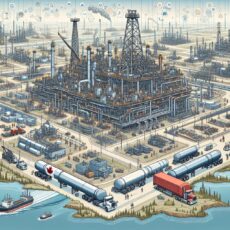The oil and gas industry in Canada has long been a hot topic of discussion. With its vast reserves and controversial practices, it has become both a crucial part of the Canadian economy and a source of concern for environmental activists. In this article, we will delve into the intricacies of this industry, exploring its impact on the economy, the environment, and the people of Canada.
The Economic Backbone
The oil and gas industry in Canada serves as a key pillar of the country’s economy. It provides numerous job opportunities and contributes significantly to the nation’s GDP. According to a report by the Canadian Association of Petroleum Producers, the industry supports over 500,000 jobs and generates billions of dollars in revenue each year. It has been a driving force in the development of Alberta’s oil sands, which is one of the largest oil reserves in the world.
Environmental Concerns
While the economic benefits of the oil and gas industry are undeniable, one cannot overlook the environmental concerns associated with it. Extracting crude oil and gas often leads to the emission of greenhouse gases and the destruction of ecosystems. The extraction of oil sands, in particular, has been criticized for its high carbon footprint and detrimental impact on land and water resources.
To mitigate these concerns, the Canadian government has implemented measures to regulate the industry’s environmental impact. These include strict emission targets, carbon pricing mechanisms, and investments in clean energy alternatives. However, striking a balance between economic growth and environmental sustainability remains a challenge.
A Closer Look at Pipelines
Pipelines are an integral part of the oil and gas industry, transporting crude oil and gas across vast distances. They are essential for connecting production sites to refineries and export terminals. However, pipeline projects have faced significant opposition from environmental groups and indigenous communities.
One notable example is the Trans Mountain pipeline expansion project. Proposed by Kinder Morgan, it aims to triple the capacity of an existing pipeline from Alberta to the west coast of Canada. The project has faced legal challenges and protests, highlighting the ongoing debate surrounding the industry’s expansion and its impact on indigenous rights, wildlife, and climate change.
The Human Dimension
The oil and gas industry in Canada has not only economic and environmental implications but also affects the lives of individuals and communities. While it provides employment opportunities, it also comes with risks and challenges. Workers in the industry face demanding and often dangerous conditions, particularly in offshore drilling and extraction sites.
Moreover, the boom-and-bust nature of the industry can disrupt local economies. When oil prices plummet, the effects are felt nationwide, leading to job losses, budget cuts, and economic downturns. This volatility underscores the need for diversification and investment in other sectors to reduce reliance on fossil fuels.
Conclusion
The oil and gas industry in Canada is a complex and multifaceted entity. Its economic importance cannot be denied, but it also raises environmental and social concerns. It is crucial for policymakers, industry leaders, and communities to work together to strike a balance between economic growth, environmental sustainability, and the well-being of Canadians. By promoting innovation, investing in clean energy alternatives, and engaging in meaningful dialogue, Canada can chart its path towards a more sustainable future.

